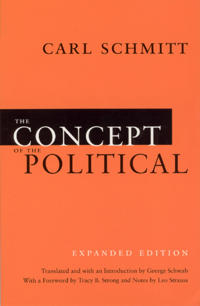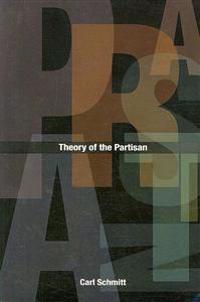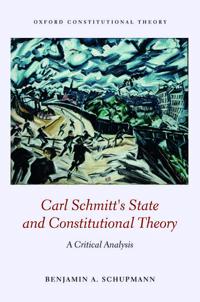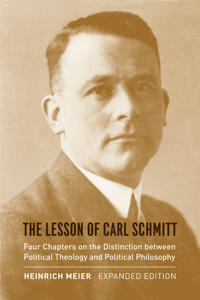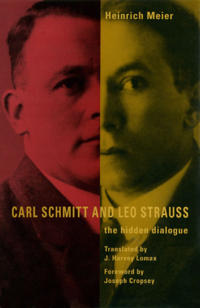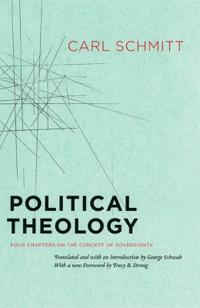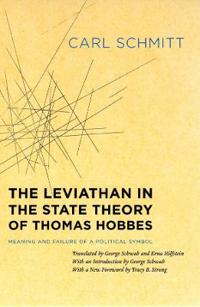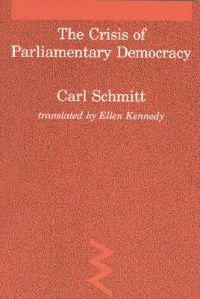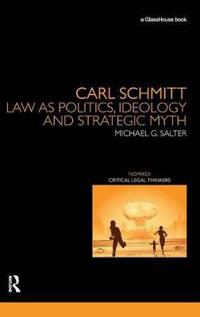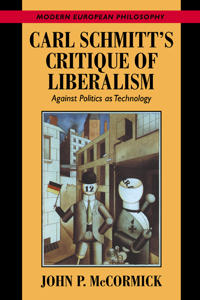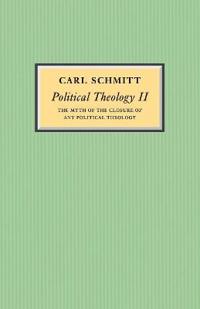The Concept of the Political (Pocket)
avCarl Schmitt, George Schwab, Carl Schmitt
ISBN: 9780226738925 - UTGIVEN: 200705In this, his most influential work, legal theorist and political philosopher Carl Schmitt argues that liberalism's basis in individual rights cannot provide a reasonable justification for sacrificing one-self for the state - a critique as cogent today as when it first appeared. George Schwab's intro[...]
The Nomos of the Earth in the International Law of Jus Publicum Europaeum (Pocket)
avCarl Schmitt, G. L. (TRN) Ulmen, Carl Schmitt
ISBN: 9780914386308 - UTGIVEN: 2006-11Theory of the Partisan (Pocket)
avCarl Schmitt, G. L. (TRN) Ulmen, Carl Schmitt
ISBN: 9780914386339 - UTGIVEN: 2007-06The Oxford Handbook of Carl Schmitt (häftad)
ISBN: 9780190943998 - UTGIVEN: 2019-03The Oxford Handbook of Carl Schmitt collects thirty original chapters on the diverse oeuvre of one of the most controversial thinkers of the twentieth century. Carl Schmitt (1888-1985) was a German theorist whose anti-liberalism continues to inspire scholars and practitioners on both the Left and th[...]
Carl Schmitt's State and Constitutional Theory
ISBN: 9780198791614 - UTGIVEN: 2017-12Can a constitutional democracy commit suicide? Can an illiberal antidemocratic party legitimately obtain power through democratic elections and amend liberalism and democracy out of the constitution entirely? In Weimar Germany, these theoretical questions were both practically and existentially rele[...]
The Oxford Handbook of Carl Schmitt
ISBN: 9780199916931 - UTGIVEN: 2017-03The Oxford Handbook of Carl Schmitt collects thirty original chapters on the diverse oeuvre of one of the most controversial thinkers of the twentieth century. Carl Schmitt (1888-1985) was a German theorist whose anti-liberalism continues to inspire scholars and practitioners on both the Left and th[...]
The Lesson of Carl Schmitt (häftad)
ISBN: 9780226518862 - UTGIVEN: 2011-09Heinrich Meier's work on Carl Schmitt has dramatically reoriented the international debate about Schmitt and his significance for twentieth-century political thought. In "The Lesson of Carl Schmitt", Meier identifies the core of Schmitt's thought as political theology - that is, political theorizing[...]
Carl Schmitt And Leo Strauss
ISBN: 9780226518886 - UTGIVEN: 2006-11Carl Schmitt was the most famous and controversial defender of political theology in the twentieth century. But in his best-known work, "The Concept of the Political," issued in 1927, 1932, and 1933, political considerations led him to conceal the dependence of his political theory on his faith in d[...]
Political Theology (Pocket)
avCarl Schmitt, George Schwab, Tracy B. Strong
ISBN: 9780226738895 - UTGIVEN: 200601Written in the intense political and intellectual tumult of the early years of the Weimar Republic, "Political Theology" develops the distinctive theory of sovereignty that made Carl Schmitt one of the most significant and controversial political theorists of the twentieth century. Focusing on the r[...]
The Leviathan in the State Theory of Thomas Hobbes (Pocket)
avCarl Schmitt, Tracy B. Strong, George Schwab
ISBN: 9780226738949 - UTGIVEN: 200810One of the most significant political philosophers of the twentieth century, Carl Schmitt is a deeply controversial figure who has been labeled both a Nazi sympathizer and a modern-day Thomas Hobbes. First published in 1938, "The Leviathan in the State Theory of Thomas Hobbes" used the Enlightenment[...]
To Carl Schmitt (Inbunden)
avJacob Taubes
ISBN: 9780231154123 - UTGIVEN: 201305A philosopher, rabbi, religious historian, and Gnostic, Jacob Taubes was for many years a correspondent and interlocutor of Carl Schmitt (1888--1985), a German jurist, philosopher, political theorist, law professor -- and self-professed Nazi. Despite their unlikely association, Taubes and Schmitt sh[...]
The Crisis of Parliamentary Democracy (Häftad)
avCarl Schmitt
ISBN: 9780262691260 - UTGIVEN: 198801Described both as "the Hobbes of our age" and as "the philosophical godfather of Nazism," Carl Schmitt was a brilliant and controversial political theorist whose doctrine of political leadership and critique of liberal democratic ideals distinguish him as one of the most original contributors to mod[...]
Political Romanticism (Häftad)
avCarl Schmitt
ISBN: 9780262691420 - UTGIVEN: 199104Carl Schmitt (1888-1985), the author of such books as Political Theology and The Crisis of Parliamentary Democracy (both published in English by The MIT Press), was one of the leading political and legal theorists of the twentieth century. His critical discussions of liberal democratic ideals and in[...]
Carl Schmitt and the Jews
ISBN: 9780299222406 - UTGIVEN: 2007-07German jurist and legal theorist Carl Schmitt (1888-1985) significantly influenced Western political and legal thinking in the last century, yet his life and work have also stirred considerable controversy. While his ideas have been used and diffused by prominent philosophers on both the left and th[...]
Carl Schmitt: Law as Politics, Ideology and Strategic Myth (Inbunden)
avNomikoi Critical Legal Thinkers
ISBN: 9780415478502 - UTGIVEN: 201203There has been and continues to be a remarkable revival in academic interest in Carl Schmitt's thought within politics, but this is the first book to address his thought from an explicitly legal theoretical perspective, as it addresses the actual and potential significance of Schmitt's thought for d[...]
Thomas Hobbes and Carl Schmitt (Pocket)
avJohan Tralau
ISBN: 9780415661218 - UTGIVEN: 2012-05Thomas Hobbes, the English 17th century philosopher, and Carl Schmitt, Hitler's 'crown jurist', a political thinker and author of an enigmatic book on Hobbes, are increasingly relevant today for two reasons. First, they address the problem of political order, so important when we witness failed stat[...]
The Legal Theory of Carl Schmitt (Inbunden)
avMariano Croce, Andrea Salvatore
ISBN: 9780415683494 - UTGIVEN: 201209The Legal Theory of Carl Schmitt provides a detailed analysis of Schmitt's institutional theory of law, mainly developed in the books published between the end of the 1920s and the beginning of the 1930s. By reading Schmitt's overall work through the lens of his institutional turn, the authors offer[...]
Values in Sport (Inbunden)
avCarl Schmitt
ISBN: 9780419253600 - UTGIVEN: 2000-02Questions such as these and many others are posed and examined by the contributors to this volume. Some are sceptical of future developments in sport and demand radical reforms to halt progress, others are more optimistic and propose that sport should adapt to new advances just as other realms of [...]
Democracy and the Politics of the Extraordinary: Max Weber, Carl Schmitt, and Hannah Arendt (häftad)
ISBN: 9780521133418 - UTGIVEN: 2009-06Although the modern age is often described as the age of democratic revolutions, the subject of popular foundings has not captured the imagination of contemporary political thought. Most of the time, democratic theory and political science treat as the object of their inquiry normal politics, instit[...]
Carl Schmitt's Critique of Liberalism (Pocket)
avJohn P. McCormick
ISBN: 9780521664578 - UTGIVEN: 1999-06This is the first in-depth critical appraisal in English of the political, legal, and cultural writings of Carl Schmitt, perhaps this century?s most brilliant critic of liberalism. It offers an assessment of this most sophisticated of fascist theorists without attempting either to apologise for or d[...]
Political Theology II: The Myth of the Closure of any Political Theology (Inbunden)
avCarl Schmitt, Translated by:Michael Hoelzl, Transla Ward
ISBN: 9780745642536 - UTGIVEN: 2009-01-31Political Theology II: The Myth of the Closure of Any Political Theology (Häftad)
avCarl Schmitt
ISBN: 9780745642543 - UTGIVEN: 200809Political Theology II is Carl Schmitt's last book. Part polemic, part self-vindication for his involvement in the National Socialist German Workers' Party (NSDAP), this is Schmitt's most theological reflection on Christianity and its concept of sovereignty following the Second Vatican Council. At a [...]
Writings on War (Häftad)
avCarl Schmitt, Timothy Nunan
ISBN: 9780745652979 - UTGIVEN: 201108"Writings on War "collects three of Carl Schmitt's most important and controversial texts, here appearing in English for the first time: "The Turn to the Discriminating Concept of War," "The Groraum Order of International Law," and "The International Crime of the War of Aggression and the Principle [...]

